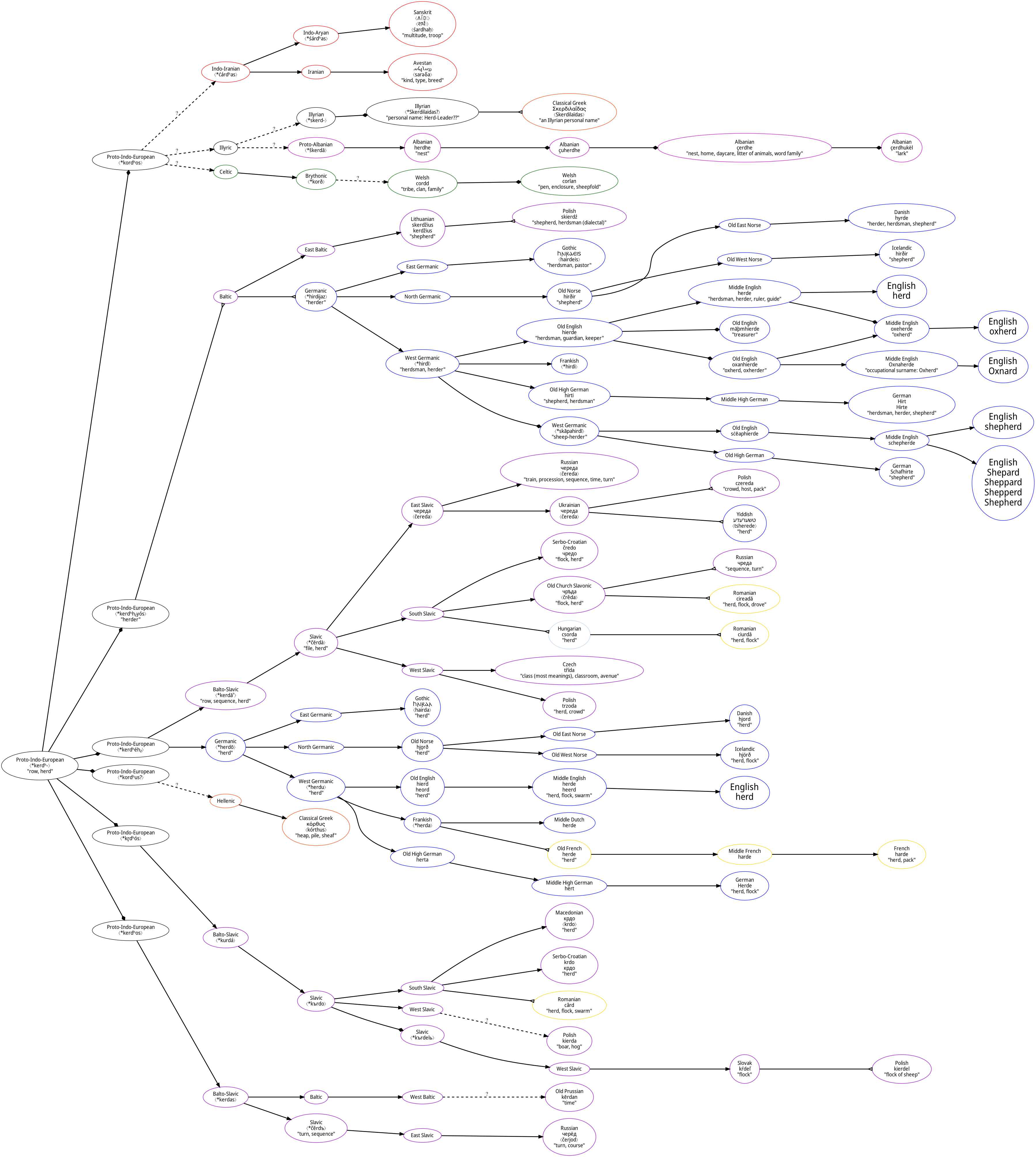Introduction
By Patreon request! This year, N7 day is a Friday, so we've got Shepard. I'm Word Family Friday, and this is my favorite Indo-European root on the Citadel.
This root appears in many forms in Germanic and Balto-Slavic, but has only marginal/uncertain presence outside those two branches.
(Family of sheep not included ... it's a huge mess!)
Teaser
Full Text
-
Proto-Indo-European *kerdʰ- row, herd
-
Proto-Indo-European *kerdʰos action/result noun
-
Balto-Slavic *kerdas
-
Baltic
-
West Baltic
- Old Prussian kērdan time
-
-
Slavic *čẽrdъ turn, sequence Slavic first palatalization, not from *ḱ-
-
East Slavic
- Russian черёд čerjod turn, course
-
-
-
-
Proto-Indo-European *kordʰos
-
Illyric
-
Proto-Albanian *škerdā
-
Albanian herdhe nest [2]
-
Albanian çuherdhe
-
Albanian çerdhe nest, home, daycare, litter of animals, word family
- Albanian çerdhukël lark
-
-
-
-
Illyrian *skerd-
-
Illyrian *Skerdilaidas? personal name: Herd-Leader??
- Classical Greek Σκερδιλαΐδας Skerdilaïdas an Illyrian personal name
-
-
-
Celtic
-
Brythonic *korð
-
Welsh cordd tribe, clan, family
- Welsh corlan pen, enclosure, sheepfold
-
-
-
Indo-Iranian *ćárdʰas as if *ḱordʰos, which the Balto-Slavic contradicts [1]
-
Indo-Aryan *śárdʰas
- Sanskrit 𑀰𑀭𑁆𑀥𑀂 śardhaḥ शर्धः multitude, troop
-
Iranian
- Avestan 𐬯𐬀𐬭𐬆𐬜𐬀 sarəδa kind, type, breed
-
-
-
Proto-Indo-European *kordʰus?
-
Hellenic
- Classical Greek κόρθυς kórthus heap, pile, sheaf
-
-
Proto-Indo-European *kr̥dʰós
-
Balto-Slavic *kurdá
-
Slavic *kъrdo
-
South Slavic
- Macedonian крдо krdo herd
- Serbo-Croatian krdo / крдо herd
- Romanian cârd herd, flock, swarm
-
West Slavic
- Polish kierda boar, hog
-
Slavic *kъrdelь
-
West Slavic
-
Slovak kŕdeľ flock
- Polish kierdel flock of sheep
-
-
-
-
-
-
Proto-Indo-European *kerdʰéh₂
-
Balto-Slavic *kerdāˀ row, sequence, herd
-
Slavic *čērdà file, herd Slavic first palatalization, not from *ḱ-
-
East Slavic череда čereda
- Russian череда čereda train, procession, sequence, time, turn
-
Ukrainian череда čereda
- Polish czereda crowd, host, pack
- Yiddish טשערעדע tsherede herd
-
South Slavic
-
Old Church Slavonic чрѣда črěda flock, herd
- Russian чреда sequence, turn
- Romanian cireadă herd, flock, drove
-
Hungarian csorda herd
- Romanian ciurdă herd, flock
- Serbo-Croatian čredo / чредо flock, herd
-
-
West Slavic
- Czech třída class (most meanings), classroom, avenue
- Polish trzoda herd, crowd
-
-
-
Germanic *herdō herd
-
East Germanic
- Gothic 𐌷𐌰𐌹𐍂𐌳𐌰 hairda herd
-
North Germanic
-
Old Norse hjǫrð herd
-
Old East Norse
- Danish hjord herd
-
Old West Norse
- Icelandic hjörð herd, flock
-
-
-
West Germanic *herdu herd
-
Old English hierd / heord herd
-
Middle English herde / heerd herd, flock, swarm
- English herd
-
-
Frankish *herda
- Middle Dutch herde
-
Old French herde herd
-
Middle French harde
- French harde herd, pack
-
-
Old High German herta
-
Middle High German hërt
- German Herde herd, flock
-
-
-
-
-
Proto-Indo-European *kerdʰh₂yós herder
-
Baltic
-
East Baltic
-
Lithuanian skerdžius / kerdžius shepherd [2]
- Polish skierdź shepherd, herdsman (dialectal)
-
-
Germanic *hirdijaz herder
-
East Germanic
- Gothic 𐌷𐌰𐌹𐍂𐌳𐌴𐌹𐍃 hairdeis herdsman, pastor
-
North Germanic
-
Old Norse hirðir shepherd
-
Old East Norse
- Danish hyrde herder, herdsman, shepherd
-
Old West Norse
- Icelandic hirðir shepherd
-
-
-
West Germanic *hirdī herdsman, herder
-
Old English hierde herdsman, guardian, keeper
-
Middle English herde herdsman, herder, ruler, guide
- English herd
-
Middle English oxeherde oxherd
- English oxherd
- Old English māþmhierde treasurer
-
Old English oxanhierde oxherd, oxherder
-
Middle English oxeherde oxherd
- English oxherd
-
Middle English Oxnaherde occupational surname: Oxherd
- English Oxnard
-
-
- Frankish *hirdi
-
Old High German hirti shepherd, herdsman
-
Middle High German
- German Hirt / Hirte herdsman, herder, shepherd
-
-
West Germanic *skāpahirdī sheep-herder
-
Old English sċēaphierde
-
Middle English schepherde
- English shepherd
- English Shepard / Sheppard / Shepperd / Shepherd
-
-
Old High German
- German Schafhirte shepherd
-
-
-
-
-
-
Visual
Collected English words
herd, herd, shepherd, Sheppard, oxherd, Oxnard
Footnotes
-
^
Indo-Iranian *ćárdʰas (appearing in Sanskrit śardhaḥ and Avestan sarəδa) requires a PIE *ḱerdʰ-, which cannot be formally reconciled with all the Balto-Slavic forms that show *kerdʰ-.
-
^
Lithuanian has variants kerdžius and skerdžius, which looks like s-mobile, but since no other languages shows the s†, I am assuming for now that this is a Lithuanian innovation, perhaps influence from *(s)ker-: "to cut, to seperate". But Lithuanian is famously conservative, and -*dʰ- is an extremely productive root extension, so *kerdʰ- might actually be *(s)kerdʰ- and might be a derivative of *(s)ker-.
† Unless Albanian herdhe: "nest" is related. Albanian h- usually reflects PIE *sk-. And then since herdhe implies Proto-Albanian *škerdā, that raises the possibility of a connection in the Illyrian king recorded in Greek as Σκερδιλαΐδας Skerdilaïdas.
